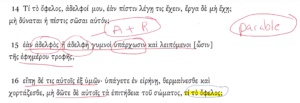
Is this another of those preachy messages to make you feel guilty about the Greek you have forgotten—or never learned in the first place? Well, hear me out. I am not trying to make you feel ashamed for not constantly verbalizing in your sermons statements like, “The Greek says here” or “the original language really says this.” I actually recommend that you rarely, if ever, say something like that from the pulpit. Stop to consider how such statements can demean a layperson and lead some to think that they can never really understand the Bible if they do not know Greek. The last thing you want to do is discourage people from studying their English Bible because the truth is really hidden from them.
I want to give you two reasons why I DO think that Greek (and Hebrew for that matter), are important for the teaching pastor.
- The first I once read from NT Greek scholar, Moises Silva. He said that the greatest benefit in knowing Greek is NOT the clever insights and “golden nuggets” that you can unveil from the NT. Its greatest value is helping you to understand what a text does NOT mean. What? I spent all this time studying aorists and participles just to discover what is wrong and not what is correct? Yes, that is one of the best values of the language. There is a lot of stuff spoken by cultists and well-intentioned teachers that simply is based on a wrong understanding of how language works. You need to raise a red flag and say “Stop! The language does NOT say that!” Tell me that such a value like that is not vital to the church today.
- The second reason that you need some familiarity with Greek is so you can intelligently evaluate the commentaries that are an essential part of your sermon and lesson preparation. You need to evaluate the claims of those commentaries and some basic language skills will help you to do that. Far more important than the so-called “golden nuggets” approach to word studies is the confidence in being equipped to evaluate what authors claim. Related to this is the whole issue of Bible versions. If you are not at least competent in the Biblical languages you cannot advise your parishioners about the strengths and weaknesses of either the KJV Only folks or those who think the most recent breezy paraphrase is the final Divine gift for which we have been waiting.
So what do I recommend? Here are a couple of easy steps to get back on board this bus. My good friend, Rob Plummer, along with Ben Merkle, have authored a terrific volume called Greek for Life. The book embodies some strategies to acquire Greek and also how to get it back if the rust has started.
Pardon the next suggestions that are a bit more personal. Seriously consider joining the Facebook group, Nerdy Language Majors. We have over 5000 members and you will find something of interest at all levels of language usage. There are many beginners asking questions about how to improve their facility with languages. You can ask questions; respond to questions; or just watch the show. On some days it is quite entertaining!
I, along with some other good Greek teachers, have some screencast videos on Exegetical Tools teaching through the Greek text of some key NT books. We walk you through each verse with simple explanations of the grammar and vocabulary in each verse. My own contribution is the Greek text of James. Believe me, you can do this. As a writer in Greek once told his protégé. This effort will both “save yourself and also those who hear you.” (1 Timothy 4:16).
Ἡ χάρις τοῦ κυρίου Ἰησοῦ Χριστοῦ μετὰ τοῦ πνεύματος ὑμῶν. “The grace of the Lord Jesus Christ be with your spirit” (Phil. 4:23 CSB).
See. That was not so hard!
Dr. William Varner
Professor, The Master’s University
Author of James: A Commentary on the Greek Text


